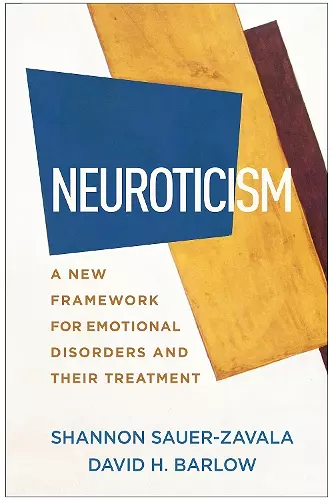Neuroticism
A New Framework for Emotional Disorders and Their Treatment
David H Barlow author Shannon Sauer-Zavala author
Format:Hardback
Publisher:Guilford Publications
Published:3rd Nov '21
Should be back in stock very soon

Neuroticism--the tendency to experience negative emotions, along with the perception that the world is filled with stressful, unmanageable challenges--is strongly associated with anxiety, depression, and other common mental health conditions. This state-of-the-art work shows how targeting this trait in psychotherapy can benefit a broad range of clients and reduce the need for disorder-specific interventions. The authors describe and illustrate evidence-based therapies that address neuroticism directly, including their own Unified Protocol for transdiagnostic treatment. They examine how neuroticism develops and is maintained, its relation to psychopathology, and implications for how psychological disorders are classified and diagnosed.
"As the traditional DSM-based account of psychopathology weakens, it is crucial to develop broader, more testable models that can integrate what is known about psychological problems and their amelioration. This groundbreaking volume builds an understanding of psychopathology on the foundation of temperament and personality, with important implications for the creation of evidence-based treatments. The book lays out a bold new idea in such a way that the entire field will be able to explore it. Highly worth reading."--Steven C. Hayes, PhD, Foundation Professor of Psychology Emeritus, University of Nevada, Reno; codeveloper of Acceptance and Commitment Therapy
"This book offers a fascinating view of mental disorders that focuses on neuroticism as a transdiagnostic factor underlying many forms of psychopathology. Written by foremost treatment developers, the book not only presents a cutting-edge theoretical model, but also addresses what this means for assessment, and, most important, intervention. It provides a compelling discussion of novel therapies that target underlying vulnerabilities instead of symptoms of specific disorders. I highly recommend this book for use in graduate courses in clinical psychology. It should be of great interest to anyone interested in understanding and treating psychopathology."--Jutta Joormann, PhD, Department of Psychology, Yale University
"Astounding in its breadth, depth, and sophistication. Sauer-Zavala and Barlow have produced a book that is likely to be frequently utilized by clinicians, researchers, and students. The authors convincingly argue that restricting assessment and treatment to narrowly defined diagnostic categories is less effective than addressing the higher-order factors that cause emotional disorders. They use detailed clinical examples to illustrate the Unified Protocol, showing how the theory and research can be translated into practice."--Deborah Dobson, PhD, RPsych, Department of Psychology, University of Calgary; private practice, Calgary, Alberta, Canada-Given the broad scope of material covered, the book should be considered the definitive statement describing research and clinical practice. It is essential reading for all clinical professionals in psychology, psychiatry, and social work and for upper-level, preprofessional students….Essential.--Choice Reviews, 5/1/2022
"As the traditional DSM-based account of psychopathology weakens, it is crucial to develop broader, more testable models that can integrate what is known about psychological problems and their amelioration. This groundbreaking volume builds an understanding of psychopathology on the foundation of temperament and personality, with important implications for the creation of evidence-based treatments. The book lays out a bold new idea in such a way that the entire field will be able to explore it. Highly worth reading."--Steven C. Hayes, PhD, Foundation Professor of Psychology Emeritus, University of Nevada, Reno; codeveloper of Acceptance and Commitment Therapy
"This book offers a fascinating view of mental disorders that focuses on neuroticism as a transdiagnostic factor underlying many forms of psychopathology. Written by foremost treatment developers, the book not only presents a cutting-edge theoretical model, but also addresses what this means for assessment, and, most important, intervention. It provides a compelling discussion of novel therapies that target underlying vulnerabilities instead of symptoms of specific disorders. I highly recommend this book for use in graduate courses in clinical psychology. It should be of great interest to anyone interested in understanding and treating psychopathology."--Jutta Joormann, PhD, Department of Psychology, Yale University
"Astounding in its breadth, depth, and sophistication. Sauer-Zavala and Barlow have produced a book that is likely to be frequently utilized by clinicians, researchers, and students. The authors convincingly argue that restricting assessment and treatment to narrowly defined diagnostic categories is less effective than addressing the higher-order factors that cause emotional disorders. They use detailed clinical examples to illustrate the Unified Protocol, showing how the theory and research can be translated into practice."--Deborah Dobson, PhD, RPsych, Department of Psychology, University of Calgary; private practice, Calgary, Alberta, Canada-Given the broad scope of material covered, the book should be considered the definitive statement describing research and clinical practice. It is essential reading for all clinical professionals in psychology, psychiatry, and social work and for upper-level, preprofessional students….Essential.--Choice Reviews, 5/1/2022
ISBN: 9781462547180
Dimensions: unknown
Weight: 520g
270 pages